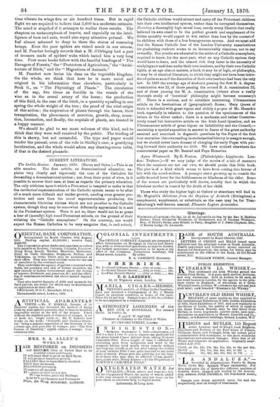CURRENT LITERATURE.
The Dublin Review. January, 1870. (Burns and Oates.)—This is an able number. The first article, on denominational education, ex- plains very clearly and vigorously the case of the Catholics for demanding a denominational system ; nor, from their point of view, is it possible to answer their case, at least as regards the primary education. The only criticism upon it which a Protestant is tempted to make is that the intellectual supernaturalism of the Catholic system seems to be after all a much more difficult and tender growth, needing even greater pro- tection and care than the moral supernaturalism producing the characteristic Christian virtues which are not peculiar to the Catholic system, though they may be somewhat differently appreciated in it and in the Protestant system. Were it not so, there would not be so great a fear of (morally) high-toned Protestant schools, on the ground of their vitiating the "Catholic atmosphere." On the contrary, one would expect the Roman Catholics to be very sanguine that, in such schools, the Catholic children would attract and carry off the Protestant children into their own intellectual system, rather than be corrupted themselves. Granting a thoroughly high moral tone, surely every Church that really believed its own creed to be the perfect growth and supplement of its divine morality would expect to win rather than loss by the contactof its children with those of a less homogeneous system. And we must add that the Roman Catholic fear of the London University examinations for graduating students seems to us inconceivably timorous, not to say cowardly. The youths are educated in the midst of a Catholic atmosphere, required to know, for the most part, what on any Catholic system they would have to learn, and the utmost risk they incur is the necessity of studyingnow and then under their own teachers, and by their own Catholic lights, at an age almost mature, a book, it may be of logic, or philosophy, it may be of classical literature, to which they might not have been intro- duced quite so soon if the discretion of their own teachers had been the only law. In 1868 the average age of students passing the first B. A. degree examination was 23, of those passing the second B. A. examination 25, and of those passing the M. A. examination (where alone a really thorough study of ' heretical ' philosophy might become necessary) 27. There is a curious, and to outsiders interesting, Ultramontane article on the fascinations of (geographical) Rome ; Mary Queen of Scots is defended with great vigour and ability a propos of Mr. Hosack's book, especially in relation to the question of the spuriousness of the letters in the silver casket ; there is a moderate and rather Conserva- tively toned but instructive article on the Irish Land Question, and an Ultramontano article of great vigour on Infallibility and the Council,— containing a special exposition in answer to Janus of the great authority asserted and exercised in dogmatic questions by the Popes of the first four centuries. Our own reading in ecclesiastical history is meagre enough, but we should never have dreamt of charging the early Popes with put- ting forward their authority too little. We have noticed elsewhere the controversial paper on Mr. Renouf and Pope Honorius.






























 Previous page
Previous page